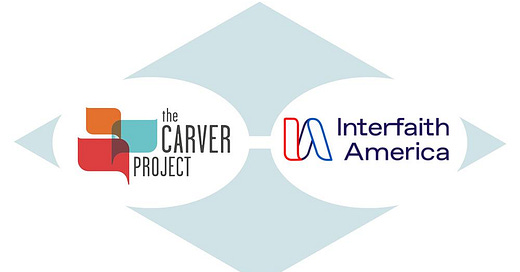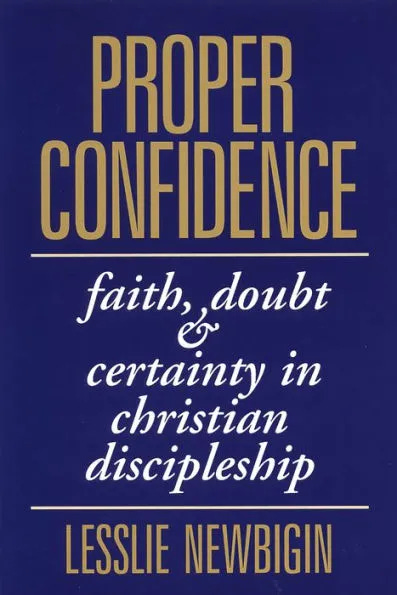How Can Christian Faculty Be Interfaith Leaders?
Reflecting on a new partnership with Eboo Patel and Interfaith America
In an earlier post, I discussed the importance of pursuing interfaith engagement without compromising core religious values. In contrast to some interfaith efforts that ignore or downplay differences, I suggested that meaningful interfaith relationships acknowledge and work across deep differences. This commitment grounds my friendship with Eboo Patel, the founder and president of Interfaith America.
In the News
Last month, Interfaith America (where I serve as a Senior Fellow) announced a new initiative with The Carver Project (an organization I founded five years ago). The initiative, which we’re calling the Newbigin Fellows, brings together cohorts of Christian faculty working at non-Christian institutions. These cohorts meet monthly over Zoom and then convene in person with the goal of cultivating relationships with one another, reflecting on the theory and practice of interfaith engagement, and developing interfaith activities on their respective campuses.
The partnership between Interfaith America and The Carver Project feels natural. Interfaith America’s mission is to “inspire, equip, and connect leaders and institutions to unlock the potential of America’s religious diversity.” The Carver Project exists “to empower Christian faculty and students to serve and connect university, church, and society.” As Eboo noted in announcing the Newbigin Fellows, the two organizations “share a commitment to building civic pluralism that values deep faith and welcomes the contributions of religious communities.”
The first cohort of Newbigin Fellows is already underway. It includes:
Lydia Dugdale (Internal Medicine, Columbia)
Jen Frey (Philosophy, South Carolina)
Evan Gurney (English, UNC-Asheville)
Alex Hartemink (Computer Science, Duke)
Andrea Leep Hunderfund (Neurology, Mayo Clinic)
Paul Lim (Religious History, Vanderbilt)
Ned O’Gorman (Communications, Illinois)
Greg Phelan (Economics, Williams)
This June, we’ll meet for a few days together in St. Louis. Our time will include a public dialogue on how faith and theology can enrich inquiry and practice in science and medicine. I will moderate the conversation between Lydia, Andrea, and Jen, including a discussion of Lydia’s 2020 book, The Lost Art of Dying: Reviving Forgotten Wisdom. The dialogue will take place on Thursday, June 1st, and is free and open to the public. Look for registration details this spring.
In My Head
The Newbigin Fellows is possible because of the hard work of people at Interfaith America and The Carver Project. It is also possible because of my friendship with Eboo. The idea began when Eboo asked: “How can we partner to help Christian faculty be more authentically Christian on their campuses?”
My Muslim friend wants my Christian colleagues to thrive as Christians. And he’s willing to put time, money, and his reputation behind that effort. That speaks volumes of Eboo’s commitment to genuine interfaith engagement.
Eboo’s commitment isn’t rooted in relativism: He believes his faith is true, and I believe mine is true. We hold mutually exclusive truth claims about things that matter. But we also care about each other and the role of authentic religious belief in a pluralistic society.
We’ve named the Newbigin Fellows after Lesslie Newbigin (1909-1998), who developed a theology of interfaith engagement as a missionary in South India and later in life working in a largely dechurched London. His life and work form a useful lens through which to consider the role of the fellows.
As we note on the Newbigin Fellows website:
Christian faculty working at non-Christian universities are uniquely positioned to lead and engage across deep differences, having two feet planted in the worlds of both church and university. Drawing upon the theological virtues of faith, hope, and love, Christian faculty can model dialogue and relationships with colleagues, staff, and students of other faiths and of no faith. Learning and understanding how to partner effectively and discover common ground in the pluralistic environment of the university is an essential prerequisite to implementing these skills and practices in a broader society where the stakes are much higher.
In the World
One of the most influential books I have ever read is Newbigin’s Proper Confidence: Faith, Doubt, and Certainty in Christian Discipleship. As I noted in a 2019 review of the book, I gave copies of it to the groomsmen at my wedding.
Proper Confidence condenses the arguments in Newbigin’s earlier book, The Gospel in a Pluralist Society. Relying on insights from the philosopher Michael Polanyi, Newbigin distinguishes confidence from post-Cartesian understandings of certainty. Faith depends on confidence, not epistemic certainty, which means that faith is always a commitment based in trust.
Newbigin’s critiques of both liberalism and fundamentalism made him too conservative for liberals and too liberal for conservatives. That is, I think, where many Christian faculty find themselves today. And based on the feedback I’ve received about Some Assembly Required, it is likely where many of you are, too.







Congrats! This is exciting.
John, this is an exciting development and one I sense is needed not only for faculty but also for students at these institutions. As a graduate student, I have been one of the only Christians in my program and have often wanted to be able to discuss the particulars of my course content with a Christian faculty member in my field. There are some disciplines (likely the arts) where there appear to be few faculty with a faith commitment. Having a fellowship that draws from a number of disciplines, especially where there tend to be fewer mentors, where there is shared thinking, discussing, and writing at this level would be tremendous.